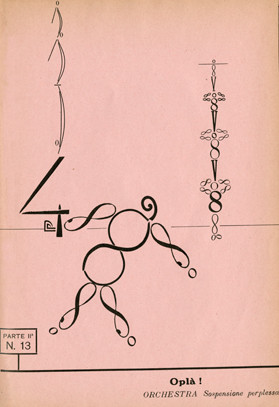Words in Freedom: Futurism at 100
13 Feb - 06 Apr 2009

© Francesco Cangiullo
Caffé-concerto: Alfabeto a sorpresa [Café-Concert: Unexpected Alphabet]
Milan: Edizioni futuriste di “Poesia,” 1919
Caffé-concerto: Alfabeto a sorpresa [Café-Concert: Unexpected Alphabet]
Milan: Edizioni futuriste di “Poesia,” 1919
Mezzanine, The Lewis B. and Dorothy Cullman Education and Research Building
The first Futurist Manifesto, published in 1909 by poet and writer F. T. Marinetti, proclaimed a burning desire—fueled by industry, war, and the machine—to race into the future. Italian Futurists followed suit by calling for a new aesthetic language appropriate for these modern times. On the one hundredth anniversary of Futurism's founding, this exhibition explores the movement's aesthetic and political concerns with a display of books, manifestos, periodicals, and handwritten correspondence by Futurist artists.
The “Manifesto of Futurism,” written by Filippo Tommaso Marinetti and published on the front page of the French newspaper Le Figaro on February 20, 1909, proclaimed the burning desire of the author and his fellow Futurists to abandon the past and embrace the future. Tired of Italy’s reliance on its classical heritage and disdainful of the present, these artists called for a new aesthetic language based on industry, war, and the machine. In addition to their prolific output of drawings, photographs, films, performances, and paintings and sculptures (examples of which are on view in the fifth-floor Painting and Sculpture galleries), the Futurists (1909–1944) published countless manifestos, leaflets, and art and poetry periodicals.
On the one hundredth anniversary of the publication of the “Manifesto of Futurism,” this exhibition explores the ways Futurist artists communicated their concerns to the masses through printed matter. In a rich new language liberated from the bounds of tradition, their poetry and rhetoric addressed topics of broad national and cultural importance, including politics, language, entertainment, and the perception and future of Italian art. Although they have been criticized by some for their aesthetic approach and their politics, the Futurists were and continue to be acclaimed for their uncontainable experiments and challenges to convention, which set the stage for the provocative, interdisciplinary nature of many artistic forms to come.
All items on display are original documents in the Special Collections of The Museum of Modern Art Library, except as noted.
The exhibition is organized by Laura Beiles, Associate Educator, Department of Education.
The first Futurist Manifesto, published in 1909 by poet and writer F. T. Marinetti, proclaimed a burning desire—fueled by industry, war, and the machine—to race into the future. Italian Futurists followed suit by calling for a new aesthetic language appropriate for these modern times. On the one hundredth anniversary of Futurism's founding, this exhibition explores the movement's aesthetic and political concerns with a display of books, manifestos, periodicals, and handwritten correspondence by Futurist artists.
The “Manifesto of Futurism,” written by Filippo Tommaso Marinetti and published on the front page of the French newspaper Le Figaro on February 20, 1909, proclaimed the burning desire of the author and his fellow Futurists to abandon the past and embrace the future. Tired of Italy’s reliance on its classical heritage and disdainful of the present, these artists called for a new aesthetic language based on industry, war, and the machine. In addition to their prolific output of drawings, photographs, films, performances, and paintings and sculptures (examples of which are on view in the fifth-floor Painting and Sculpture galleries), the Futurists (1909–1944) published countless manifestos, leaflets, and art and poetry periodicals.
On the one hundredth anniversary of the publication of the “Manifesto of Futurism,” this exhibition explores the ways Futurist artists communicated their concerns to the masses through printed matter. In a rich new language liberated from the bounds of tradition, their poetry and rhetoric addressed topics of broad national and cultural importance, including politics, language, entertainment, and the perception and future of Italian art. Although they have been criticized by some for their aesthetic approach and their politics, the Futurists were and continue to be acclaimed for their uncontainable experiments and challenges to convention, which set the stage for the provocative, interdisciplinary nature of many artistic forms to come.
All items on display are original documents in the Special Collections of The Museum of Modern Art Library, except as noted.
The exhibition is organized by Laura Beiles, Associate Educator, Department of Education.
